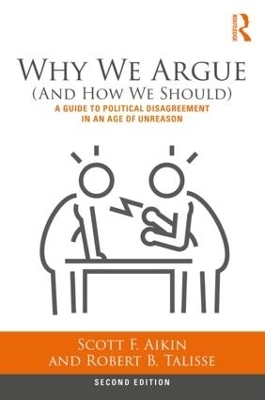
Why We Argue (And How We Should)
Routledge (Verlag)
978-1-138-08742-2 (ISBN)
Written in a lively style and filled with examples drawn from the real world of contemporary politics, and questions following each chapter to encourage discussion, Why We Argue (And How We Should) reads like a guide for the participation in, and maintenance of, modern democracy. An excellent student resource for courses in critical thinking, political philosophy, and related fields, Why We Argue (And How We Should) is an important contribution to reasoned debate.
What’s New in the Second Edition:
Updated examples throughout the book, including examples from the 2016 U.S. election and first years of the Trump presidency;
Expanded coverage of dialectical fallacies, including coverage of new types of fallacies and of sites where such fallacies thrive (e.g., cable news, social media);
Revised For Further Thought questions and definitions of Key Terms, included at the end of each chapter;
The addition of five new chapters:
Deep Disagreement
Argument by Analogy
Argument between the Ads
The Owl of Minerva (or weaponizing metalanguage)
Argumentative Responsibility and Repair.
Scott F. Aikin is Assistant Professor of Philosophy at Vanderbilt University. His previous books include Evidentialism and the Will to Believe (2014) and Epistemology and the Regress Problem (Routledge 2011). Robert B. Talisse is W. Alton Jones Professor of Philosophy and Professor of Political Science at Vanderbilt University. He is the author of five books, including Engaging Political Philosophy (Routledge 2016), Pluralism and Liberal Politics (Routledge 2011), and Democracy and Moral Conflict (2009).
Introduction Part I: A Conception of Argument 1. Why Do We Argue? 2. Why Argument Matters 3. Public Argument in a Democratic Society 4. Deep Disagreements Part II: Case Studies in Public Argument 5. The Simple Truth Thesis 6. Pushovers 7. Tone of Voice 8. The Surprising Truth about Hypocrisy 9. Arguments by Analogy 10. Argumentation Between the Ads 11. Language, Spin, and Framing 12. Argument Online Part III: Repairing Public Argument 13. The Owl of Minerva Problem 14. Argumentative Responsibility and Argument Repair 15. Civility in Argument Index
| Erscheinungsdatum | 19.09.2018 |
|---|---|
| Verlagsort | London |
| Sprache | englisch |
| Maße | 152 x 229 mm |
| Gewicht | 340 g |
| Themenwelt | Geisteswissenschaften ► Philosophie ► Logik |
| Sozialwissenschaften ► Kommunikation / Medien ► Kommunikationswissenschaft | |
| Sozialwissenschaften ► Politik / Verwaltung | |
| ISBN-10 | 1-138-08742-4 / 1138087424 |
| ISBN-13 | 978-1-138-08742-2 / 9781138087422 |
| Zustand | Neuware |
| Haben Sie eine Frage zum Produkt? |
aus dem Bereich


